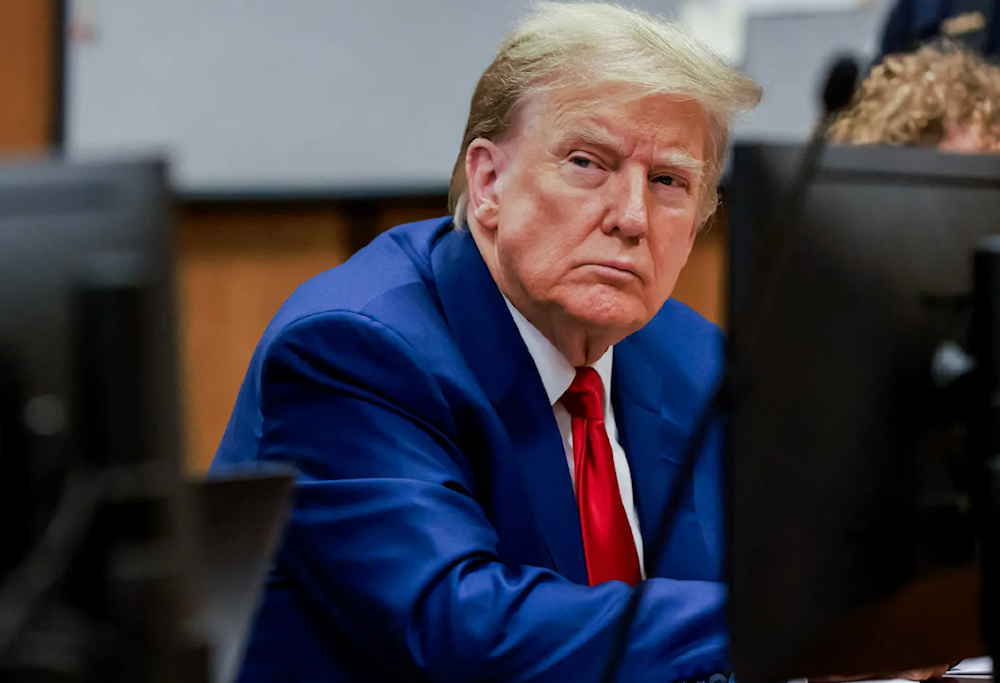Taiwan 'stole our chip business', 'should pay for defense': Trump
Taiwan purchases virtually all of its weaponry from the US through government-negotiated foreign military sales, making it one of the most important markets for American defense contractors.
-

Former President Donald Trump attends a hearing in New York City, on March 25, 2024. (AFP)
Former US President Donald Trump announced that Taiwan should pay the US for its defense guarantees, causing concern in the island on Wednesday.
After accusing Taiwan of "stealing our chip business" in a Bloomberg interview, shares of Taiwan Semiconductor Manufacturing Co. (TSMC), the world's largest chipmaker by sales, fell 2.4%.
Trump further elaborated in the interview that Taiwan "doesn't give us anything" and should "pay the US for defense."
Taiwan purchases virtually all of its weaponry from the US through government-negotiated foreign military sales, making it one of the most important markets for American defense contractors. Over the last year, Congress has also passed legislation authorizing some military aid.
Taiwan's Premier Cho Jung-tai responded on Wednesday, stating that Taipei and Washington intend to improve their relations in the future. "Making such efforts and wishing them the best is all we can do," he said.
He cited Taiwan's recent steps to reinforce its defenses, such as consistent increases in the military budget and the reinstatement of year-long conscription for men, and stated that the government was eager to go further.
Cho did, however, emphasize the significance of international support. The US's defense cooperation and regular professions of support "have made Taiwan an even more determined member of the global community with common responsibility for regional peace and stability," he added.
The US has long pledged to assist the island in case of a confrontation with China, which views the island as part of the country.
President Joe Biden has consistently confirmed the US' commitment to safeguarding Taiwan, even stating that the country will deploy troops to this end. However, Trump has previously questioned US connections to Taiwan, stating in a Bloomberg interview that it would be "very, very difficult" for the US to defend Taiwan from what he called a Chinese "invasion".
“They took almost 100% of our chip industry, I give them credit . . . Now we’re giving them billions of dollars to build new chips in our country, and then they’re going to . . . bring it back to their country,” Trump stated.
China suspends arms control talks with US over arming Taiwan
China announced Wednesday that it stopped important arms control and non-proliferation negotiations with the United States, accusing Washington of continuing military supplies to Taiwan.
Lin Jian, a spokesperson for the Chinese Foreign Ministry, announced that the US continued to sell weapons to Taiwan despite Beijing's objections. The US actions had "severely damaged the political atmosphere necessary for continued arms control consultations between the two sides," he said.
During a press briefing today, Lin announced that "China has decided to suspend talks with the US on holding a new round of arms control and non-proliferation consultations," adding that "the responsibility for this situation lies entirely with the US," directly accusing Washington for the interruption of discussions.
China was eager to continue communicating with the US on the subject but only if "the US respects China's core interests and creates the necessary conditions for dialogue and exchange between the two sides," he added.
China and the US started negotiations on weapons control and nuclear nonproliferation less than a year ago. According to the Chinese Foreign Ministry, the two nations met for the first time in four years in Washington in November and agreed on the necessity of maintaining such contact under circumstances of respect and confidence.
In June, the Pentagon's Defense Security Cooperation Agency confirmed the State Department's possible sale of $360 million worth of drones and missiles to Taiwan.
Beijing strongly opposed the US arms sales to Taiwan, criticizing Washington for aiding what it perceives as efforts to promote "Taiwan independence" through military strengthening. China also resolutely opposes the US interference in Taiwan affairs in any way or under any pretext.
Last month, Reuters reported that China imposed countermeasures on Lockheed Martin's relevant entities and senior executives over arms sales to Taiwan.

 4 Min Read
4 Min Read








